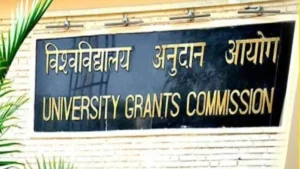यूजीसी से दिल्ली के आठ विश्वविद्यालय फर्जी घोषित, फिर भी...
Read More
What is the Admission Process for PhD in Indian Universities?
Pursuing a PhD (Doctor of Philosophy) in India is a significant step toward academic excellence and research-oriented careers. Indian universities follow a structured admission process to select deserving candidates for their doctoral programs. This guide provides a comprehensive overview of the admission process for PhD programs in Indian universities.
Table of Content:
- Eligibility Criteria
- Application Process
- Entrance Examination
- Interview and Research Proposal Submission
- Selection and Admission Offer
6. PhD Coursework and Registration
7. Duration and Thesis Submission
8. Conclusion
Consult with our Counselor
Eligibility Criteria
The basic eligibility criteria for admission to a PhD program in India generally include:
Master’s Degree: Candidates must have a Master’s degree (e.g., M.A., M.Sc., M.Tech., MBA, etc.) in a relevant field with a minimum of 55% marks (50% for reserved categories) from a recognized university.
MPhil (Optional): Some universities prefer candidates with an MPhil degree, though it is not mandatory in most cases.
NET/GATE/SLET Qualification: Many universities require candidates to qualify for entrance exams like UGC-NET, CSIR-NET, GATE, or SLET to be eligible for PhD admission.
Application Process
The PhD admission process begins with applying to the desired university. The key steps include:
Online/Offline Application: Candidates must fill out the university’s PhD application form, available on the official website.
Application Fee: A nominal fee is charged, which varies by university.
Submission of Documents: Applicants must upload/submit documents such as academic transcripts, research proposal, identity proof, and entrance exam scorecards (if applicable).
Entrance Examination
Most Indian universities conduct an entrance exam to assess candidates’ research aptitude and subject knowledge. The exam format generally includes:
Research Methodology & Aptitude: Tests analytical and research-related skills.
Subject-Specific Questions: Evaluates knowledge in the chosen research field.
General Awareness: Some exams include a section on current affairs and general knowledge.
Universities that accept national-level exams (UGC-NET, CSIR-NET, GATE) may exempt candidates from their own entrance tests.
Interview and Research Proposal Submission
Shortlisted candidates are called for an interview, which is a crucial part of the admission process. The selection committee evaluates:
Research Proposal: A well-defined research problem, objectives, methodology, and expected outcomes.
Academic Background: Past achievements, publications (if any), and subject knowledge.
Interest in Research: The candidate’s passion and suitability for doctoral research.
Selection and Admission Offer
Based on the entrance test and interview performance, universities release a merit list. Selected candidates receive an admission offer and are required to:
Pay the admission fee.
Complete enrollment formalities.
Begin coursework and research under an assigned supervisor.
PhD Coursework and Registration
Once admitted, students must complete mandatory coursework, which typically includes:
Research Methodology
Literature Review and Thesis Writing
Subject-Specific Electives
After coursework completion, candidates must register for the PhD program and begin their research under faculty guidance.
Duration and Thesis Submission
A PhD in India typically takes 3-6 years. The key milestones include:
Periodic Progress Review: Candidates must present progress reports at regular intervals.
Research Paper Publications: Many universities require PhD scholars to publish at least one research paper in a reputed journal.
Thesis Submission & Viva Voce: After completing research, candidates submit their thesis, which undergoes external review before the final oral defense (viva voce).
Conclusion
The PhD admission process in Indian universities is rigorous but well-structured, ensuring that only dedicated and capable researchers pursue doctoral studies. Candidates should carefully review university-specific guidelines, prepare thoroughly for entrance exams, and develop a strong research proposal to enhance their chances of admission.
UGC Releases Important Notice For Students, Warns Against Fake Universities Awarding Degrees
UGC Releases Important Notice For Students, Warns Against Fake Universities...
Read MoreNAAC: What about accreditation of accreditors?
NAAC: What about accreditation of accreditors? The NAAC is in...
Read MoreHow to Prepare for a PhD Interview Without a Specific Research Topic?
How to Prepare for a PhD Interview Without a Specific...
Read More


